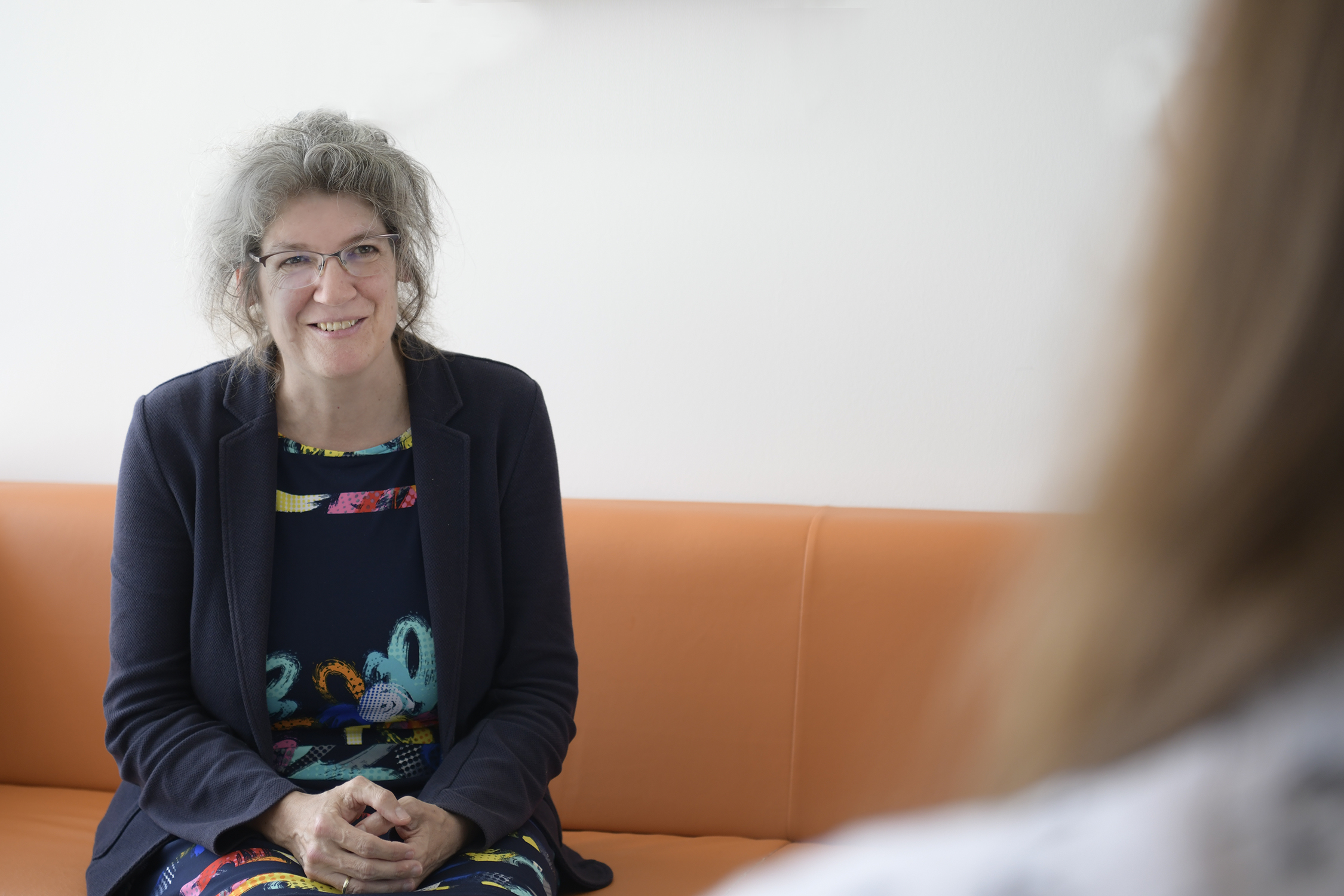Quantum computers are currently expected to bring nothing less than a paradigm shift: the significantly increased amount of information that can be processed is raising high expectations. Researchers see the opportunity to carry out completely new computing operations to solve mathematical problems that have so far prevented conventional computers from working. Eva Fröhlich from our »Communication« team talks to our Institute Director Prof. Dr. Anita Schöbel and Dr. Pascal Halffmann, Research Coordinator Quantum Computing at the Fraunhofer ITWM, about the current state of research.
Quantum Computing: Gold-Rush Fever in Research
Interview with Prof. Dr. Anita Schöbel and Dr. Pascal Halffmann
The Fraunhofer-Gesellschaft has defined quantum technology as a strategic field of research and is thus pooling the expertise of the various Fraunhofer Institutes. What are the most important findings from Fraunhofer series to date?
Anita Schöbel: First of all, I realized that it is incredibly exciting to talk about and research quantum computing. Since I have immersed myself in this field, I have found many open research questions and that is fun. But I've also noticed that: Quantum computing is very collaborative, especially in the Fraunhofer context – I don't know of any other area where Fraunhofer collaborates so intensively. It's not just our departments or the institutes themselves, we even work with universities and the Leibniz and Max Planck Institutes across research institutions. I think it's remarkable that quantum computing brings so many people together.
Pascal Halffmann: Quantum computing is a very broad, interdisciplinary field, which means we need different skills. In the beginning, we had a very broad approach here at the Fraunhofer ITWM. I think that we have now found our niche in which we can best transfer the strengths that we already have in the departments to the quantum world. And that is in the field of applied quantum computing. Improving classical algorithms and hybrid algorithms is where we are strong and where we have achieved good results in recent times. Be it in financial mathematics, image processing or high performance computing – we are seeing progress. Our investment in these areas in the last three to four years are paying off scientifically.

Since 2021, Fraunhofer has been able to test application-related quantum software and expand its expertise on the »IBM Quantum System One« in Ehningen, the most powerful quantum computer in Europe to date. It is now known that this cooperation will not be continued in its current form. What will happen with practical research?
Anita Schöbel: The experience from Ehningen really helped us to take the first steps. We calculated a lot in the IBM Cloud and we saw a lot: To be honest, most of all what is not yet possible, but definitely progress. The collaboration will continue in a different form, Fraunhofer will continue to have computing time at IBM. But this also offers us the opportunity to look at other hardware platforms. There are very different types of hardware that are perhaps better or less suitable for certain algorithms. It is therefore important that we also explore other platforms.
Pascal Halffmann: At IBM in particular, we have been able to see very clearly how hardware has developed. This is very important for us because we are partly involved in building hardware ourselves. And I agree that we are clearly hardware agnostic, because we can't predict at this point in time which hardware technology will develop and how, and which will really become established. We are testing a broad selection. But it's definitely important for us to have some form of access to hardware so that we can see: How is the progress? Do the algorithms we are developing work? We want practice, we want application-oriented research and so we also have to look at: how well do our methods work in application? And this is particularly important for our young scientists, so that they get a feeling for how to work with a quantum computer.
Almost all departments at the Fraunhofer ITWM have gained initial experience with quantum computing. Where do you see the greatest potential? Are there any projects that stand out?
Anita Schöbel: With image processing, you can literally see how the recognition of images is getting better and better. For the simulation, we put a lot of work into the fast Fourier transformation, so we can assess both the potential and the pitfalls. And in the Rymax project, I find it impressive that we are involved in the construction of a real quantum computer in Kaiserslautern. Not in the construction itself, but we are trying to contribute the algorithms and also those that mediate between software and hardware. That is exciting to experience.
Pascal Halffmann: In financial mathematics and optimization, we focus on algorithms, in particular algorithms from quantum machine learning and quantum optimization, which we really – and this is the exciting thing here – try out with specific use cases. In the energy sector, for example, we have solved a power plant scheduling problem. This has definitely brought significant improvements in the performance of quantum machine learning.
The public has high expectations of quantum technologies and there is a great deal of interest. What do you think is realistic in the near future?
Anita Schöbel: Unfortunately, it's still a bit of a guess as to what will be ready for industrial use and when. We have identified a few areas where we believe progress is realistic. What I find interesting is that the areas where we can prove mathematically that it really is better than anything we've seen before still seem to be further away from application than other areas, such as optimization, where quantum annealing technology, for example, is already working quite well. Quantum annealing is not an exact procedure that leads to a provably good solution, but a heuristic. However, it is becoming apparent that this may be better than other methods that are currently available.
Pascal Halffmann: In my view, public expectations have changed over the past year and a half. People have become a little more realistic after the first two years of quantum hype – we surfed along on this wave. We have taken advantage of this, but we have always remained realistic.
Anita Schöbel: I agree with you! My very first application for AnQuC already states that we are starting with the aim of seeing what works and what doesn't work. And I also agree with you that expectations are becoming more realistic.
Pascal Halffmann: We can't promise that we will have quantum superiority in five years' time. Even if some people postulate this, we have not yet seen any reliable arguments for this. Nevertheless, we are optimistic that the use of (hybrid) quantum algorithms will provide advantages in certain areas, some of which include our areas of application. Until then, however, there is still plenty of work to be done, especially in order to achieve sustainable practical benefits from these algorithms.
In conclusion: From a scientific point of view, what fascinates you about the topic of quantum?
Pascal Halffmann: I jumped in at the deep end when I joined the Fraunhofer ITWM. I had no background in quantum computing when I came here and started straight away with my first project. For me, the exciting thing is simply that we have to completely rethink things, this big difference to classical methods. It's fascinating to be involved in a young topic at an early stage. There's a kind of gold-rush fever in research.
Anita Schöbel: I feel the same way. New paradigms are emerging. There are many things that are turning around a bit and that makes it particularly exciting from a scientific point of view. Quantum computers offer potential and maybe we need another spark, a brilliant idea, and then something completely new could emerge. The whole time you have the feeling that the last word has not yet been spoken.
